- Home
- Gavin Chappell
The Kingdom That Rome Forgot
The Kingdom That Rome Forgot Read online
The Kingdom that Rome Forgot
GAVIN CHAPPELL
Copyright © Gavin Chappell 2018
Cover art by Sdanir
All illustrations provided under license from Wikimedia.
All rights reserved. No part of this book may be reproduced or transmitted in any form or by any electronic or mechanical means, including photocopying, recording or by any information retrieval system, without the written permission of the publisher and author, except where permitted by law.
The right of Gavin Chappell to be identified as the author of this work has been asserted by him in accordance with the Copyright, Designs and Patents Act 1988.
Published by Schlock! Publications 2018
ISBN-13: 978-1725603400
ISBN-10: 1725603403
This book is a work of fiction and any similarities to actual persons and/or places are purely coincidental.
Schlock! Publications
www.schlock.co.uk
In the same series:
On Hadrian’s Secret Service
Murder in Hadrian’s Villa
The Hadrian Legacy
Our Man in Alexandria
The Games of Hadrian: The Gladiator Gambit
The Games of Hadrian: The Archimedes Stratagem
And by the same author:
Crocodile and Leopard
The Man Who Sold the Roman Empire
…with acknowledgements to Gustave Flaubert.
—1—
Camp of the Twenty-Second Legion, Nicopolis, Province of Egypt, Ides of October 124 AD
‘Permission denied,’ said Avidius Pollio sharply. He gazed up at the tall figure standing before the wide marble topped desk and scowled.
‘I can’t spare you, tribune,’ he added, rising smartly to his feet. He came out to lean himself against the side of the desk, arms folded. ‘This is the third request for transfer in a month,’ he added, when there was no change in the tribune’s grave expression. ‘What’s it all about?’
Avidius Pollio, legate of the Twenty Second Legion, regarded his chief intelligence officer glumly. Gaius Flaminius Drusus was a tall, spare young man in his mid-twenties, clad unusually in full dress uniform. The legate had grown so accustomed to seeing the man in some kind of disguise, it seemed odd for him to resemble a military man. Flaminius was almost half Avidius Pollio’s age, but there was something in his grey eyes that spoke of experiences beyond even those of the middle aged legate.
He saluted stiffly. ‘I’m not achieving anything here, sir,’ he said bitterly. ‘Since the end of summer, everything’s been quiet. No sign of Arctos stirring up trouble, the gladiators are quiet, the river pirates have vanished into the Delta... The emperor doesn’t consider Egypt to be of any importance right now. I would be better placed serving with another legion in a more endangered province.’
‘You’re not happy here,’ Avidius Pollio observed dryly. ‘You’ve been silent and withdrawn ever since. Missing your family back home?’ Flaminius shook his head vehemently. ‘Then what is it? A woman?’
Flaminius said nothing. Avidius Pollio’s face cleared.
He slapped Flaminius on the shoulder. ‘Forget her,’ he advised. ‘There are plenty more in this man’s empire. You have my express permission to visit the brothels of Canopus. That’ll cure your itch! I’m not having my chief spy down in the dumps because of a single woman.’
‘It’s not just one woman,’ said Flaminius despairingly.
‘For Jove’s sake!’ Avidius Pollio roared. ‘I don’t want to know the lurid details. Take a quick furlough in Canopus, then come back rested and refreshed and ready for whatever the barbarians have to throw at us next.’
‘But the barbarians aren’t throwing anything at us,’ said Flaminius. ‘That’s the point. Not that I don’t want to get away from her,’ he went on, ‘and not that I don’t want to get back to her,’ he added, stressing the second “her” to make it clear that this was a different female, ‘but my talents as an imperial agent are wasted in Egypt. Everything is quiet. The raiders from the desert are nowhere to be seen. Arctos fled the province. The Judaeans are cooperating.’ He shook his head sadly. ‘Egypt is too far away from the main action! I wasn’t made to sit in an office all day, reading reports…’ He broke off, glancing at the legate’s own cluttered desk.
Avidius Pollio laughed hollowly, and went to sit down again. He picked up a sheaf of documents. Most of them were reports, and only one of them was Flaminius’ formal request for transfer.
He held the latter to the flame of the oil lamp that sat in the middle of the desk. It flared up and blackened to ash, taking with it Flaminius’ last hope of escaping his troubles in Egypt.
‘The whole empire is at peace, lad,’ the legate told Flaminius. ‘The emperor has created something none of his predecessors have achieved since the Divine Augustus himself: peace within and without. The Caledonians are quiet—this new wall is keeping them at bay. The Germanic tribes are quiescent. The Parthians are peaceful. But maybe there’s still one threat, unsuspected. An old enemy. The oldest, one might say.’
Flaminius looked inquiringly at him. ‘An old enemy. The Gauls? The Etruscans? The… Samnites?’
Avidius Pollio gave a thin lipped smile. ‘Over in Carthage,’ he went on, ‘there has been no rain for three years. People talk of the anger of the gods. Some say that Hannibal’s city should never have been rebuilt. Other people say that it is time the Roman yoke was cast off.’
Flaminius folded his arms. ‘People say that sort of thing all the time,’ he said. ‘Just because Carthage has had no rain recently… Oh, I’d read something about it myself,’ he added, remembering one of the interminable reports his network of agents had sent him. ‘But I dismissed it as the fantasies of frustrated men with no potential to translate words into action.’
He dimly recalled the history lessons his tutor had given him as a boy. After the Third Punic War the city of Carthage, which had previously rivalled Rome for control of the West, had been razed to the ground, and the very fields ploughed with salt so nothing would grow there. More recently, the Romans had relented. Julius Caesar, camped near the ruins during the civil war, had planned their rebuilding on the basis of a dream. Although he was murdered before he could carry out his plan—some said that this was the wrath of the gods at his presumption—the Emperor Augustus had established a new city atop the ruins of the old.
‘You’re right,’ Avidius Pollio conceded, ‘that the Carthaginians of today, even those of Punic descent, are a far cry from the likes of Hannibal. Their city is long forgotten, the Roman colony built on its site deserted by its Punic gods. Speaking of gods, do you know what some people say spelled the death of Carthage?’
‘Scipio’s legions?’ Flaminius suggested sardonically. ‘Hannibal defeated the Romans, the Romans defeated the Carthaginians. A simple case of tit for tat.’
‘Some people say,’ Avidius Pollio persisted, lowering his voice, ‘that Carthage remained invincible as long as the Veil of Tanit remained in the temple of that goddess, much like the Palladium in Troy. It was the power of Tanit, to whom in times of drought the Carthaginian people sacrificed their firstborn in return for rain, that kept Carthage strong. As long as the goddess’s statue held the Zaïmph, the bejewelled veil in the holy of holies, the city would be mistress of the world.’
‘So how come Rome managed to beat her?’ Flaminius asked. ‘How come Scipio defeated the Carthaginians? Didn’t Tanit help?’
He laughed, then peered worriedly at the legate. Had Avidius Pollio been out in the sun too much? Not that there was a lot of sun in January, even in Egypt, but the man had clearly been overdoing it.
‘Some people say,’ Avi
dius Pollio went on, ‘that before the tide of war turned in favour of the Romans, the veil of Tanit was stolen from the sanctuary by a Gaulish mercenary. This spelled the beginning of the end of Carthaginian supremacy. And so it came to pass.’
‘What in Pluto’s name are you saying?’ said Flaminius hotly. ‘That Rome owes her rise to the theft of a holy relic by some Gaul?’ He paused. ‘What happened to the Gaul, anyway? And what happened to the veil?’
‘The Gaul died soon after,’ Avidius Pollio explained; ‘some say struck down by the goddess’ wrath; the veil’s fate remained a mystery until the present day. It was not in the goddess’s sanctuary when Scipio led his legions into the city at the end of the final war. All this was forgotten about even by the people of Carthage itself, until the recent drought. Now it is said that babies have gone missing. That the ancient rites of human sacrifice have been secretly performed. That the ancient cult of Tanit has been reinstated.’
‘I see,’ said Flaminius thoughtfully. ‘And the drought’s still not ended? Not much use, then, this goddess.’
Avidius Pollio grunted, as if dismissing everything he had said as the superstitious nonsense it undoubtedly was. He produced another report. ‘And what of Claudius Mercator? He says he’s found a new route to Phazania, and the kingdom of the Garamantes.’
Flaminius felt a headache beginning. Was he being dense? He failed to see any connection.
And was the legate running another intelligence operation? Avidius Pollio had been keeping his ear to the ground. It was the result of too much peace, he told himself. In times like these, even legates interested themselves in trivia. The man was getting old if he thought an eccentric Alexandrian merchant worth worrying about.
Claudius Mercator was a prominent figure of the mercantile class, prone to making wild claims to garner financial support for even wilder ventures. It was public knowledge that the old fool was in town again, with stories of a new route to a lost city of the desert or somesuch. Flaminius had no savings, but even if he had, he knew exactly where he wouldn’t be investing them.
‘The Garamantes?’ he said. ‘I thought they were all wiped out long ago.’
The Garamantes were a people of the Libyan Desert who had made numerous raids on the Romans in chariots until the Romans struck back, ten thousand legionaries marching south through trackless and almost waterless desert to sack their chief city, Garama, and lay waste their desert empire.
The legate shook his head. ‘They’ve carried out a few raids against the empire in recent years,’ he said, ‘which resulted one retaliatory campaign. After which we have heard little from them, but trade routes exist across the desert, although they are shifting and uncertain, since the nomads do their utmost to fill in the wells that desert travellers need to survive the journey. It seems that the road to Garama has been reopened.’
‘Trade?’ asked Flaminius. ‘Trade in what, anyway? Sand? Snakes? Scorpions? What have they got to trade out there in the desert?’
Avidius Pollio consulted a waxen tablet. ‘Ivory,’ he said, ‘and Ethiopian slaves. Wild beasts for the arena. Natron… Salt... And of course, carbuncles.’
Flaminius made a face. ‘Carbuncles?’ he said, puzzled. ‘My mother’s uncle suffered from them for many years. Very nasty. Why would anyone want to trade them?’
Avidius Pollio looked exasperated. ‘Garamantian carbuncles,’ he explained, ‘are semiprecious stones, red in colour[1].’ He clapped his hands and the scribe came over carrying a sword clasp. In the middle of it sat a large fiery red stone, redder even than Flaminius’ maternal uncle’s boils.
The tribune shrugged. ‘Very pretty,’ he said, ‘but hardly empire-shattering. And this is what Claudius Mercator is after? But why should we be interested in him? Even if the empire’s at peace, it all seems pretty inconsequential.’
‘Claudius Mercator is scheduled to address a meeting of scholars and citizens at the Museum this evening,’ Avidius Pollio said, ‘where he will relate his abortive expedition into Phazania. He’s looking for donations towards another journey. But the rumour is that, using a newer, shorter route, he got as far as Garama itself. The city remains, it seems, although it is not easily accessible. And in the main temple of the city, the merchant noticed something of interest to us all.’
Flaminius suppressed a yawn. ‘And what was that?’ he asked indulgently.
‘The veil of Tanit.’
Flaminius stood bolt upright. ‘The what?’ he exclaimed.
‘The Zaïmph,’ said Avidius Pollio. ‘Aha, it’s all coming together, isn’t it? You’ve been searching in all the wrong places when you were looking for trouble. Yes, the Garamantes were allies of the Carthaginians in the old days, and they worshipped many of the same gods. They still have a temple to Tanit. It must have been looted during the Roman attack, but apparently they’ve rebuilt it since then. And according to Claudius Mercator, the statue of Tanit now holds the very veil that was stolen from her temple in Carthage.’
‘Oh, come off it,’ said Flaminius with an uneasy laugh. ‘How could the veil have got there? There must be a thousand miles of barren mountains and deserts between Carthage and Garama. And why didn’t Cornelius Balbus see it when he sacked the city?’
Balbus had led the original Roman attack on the Garamantes. Surely he would have noticed the famous veil. By now it would have been on display in the temple of Jupiter on the Capitoline in Rome.
Avidius Pollio shook his head. ‘It’s a mystery. Bear in mind that all this is the rumour of the wine shop. No doubt too plebeian for your own agents to report. And yet by now it’s the talk of everywhere from Alexandria to Carthage. But in lieu of anything else to keep you occupied, tribune, I’d like you to send one of your people to this public meeting and listen to what Claudius Mercator has to say.
‘With the situation so volatile in Carthage right now, we can’t afford to allow such rumours to be bruited about unchallenged. If the Carthaginians think that the veil of Tanit has been rediscovered, they are going to rally around it like a standard. And then it will no longer be their own children’s blood they’re shedding in sacrifice to the goddess. It’ll be the blood of Roman citizens, in the name of a mad dream of a resurgent Carthage.’
‘A mad dream for certain,’ said Flaminius, but the vision chilled him. ‘Very well, I’ll pop down to the Museum myself, and hear what Claudius Mercator’s got to say.’
‘You have an agent in the Library, don’t you?’ Avidius Pollio said, returning his attention to the sheaf of reports. ‘No need for you to go yourself.’
Flaminius patted his stomach. ‘I need the exercise,’ he said breezily. He was developing a paunch from recent inactivity. ‘Besides,’ he added slowly, ‘there’s been a little friction in that department. I don’t think Ozymandias—my man in the Library—is dependable anymore.’
He didn’t mention how he had alienated his agent. The legate would not approve. Ozymandias certainly hadn’t.
‘And supposing it turns out that wine shop rumour is true,’ Flaminius went on. ‘What do you suppose I should do about it, if the veil of Tanit has been found and is hanging up in the temple of a lost desert city? You realise that the whole thing could be nonsense. Claudius Mercator is a fantasist. He’s notorious for cooking up wild tales in the hopes that someone will finance his caravans. For all we know Garama never recovered from the Roman attack. It could be a dead city.’
‘That’s as maybe,’ said Avidius Pollio. ‘But if it turns out that Claudius Mercator did indeed see the veil of Tanit, then we have only one option. You must join the caravan…’
‘Join the caravan?’ Flaminius echoed. ‘Doesn’t Claudius Mercator have any say in the matter?’
‘Your cover will be that of a wealthy, idle young man about town,’ Avidius Pollio said, ‘who fancies a spot of adventure. It’s not far from the truth,’ he added waspishly, ‘apart from the wealth. Tell him you’re willing to finance his expedition as long as he takes you with him. You can chalk up any expe
nses to the legion’s account—within reason, of course.’
‘You want me to join a lunatic expedition to a lost city?’ Flaminius demanded. ‘Trek south over a thousand miles of sand and rock, all on the off chance that there’s a word of truth in traveller’s tales? Risk life and limb in the country of charioteering desert nomads? And then what do you suppose I do? Steal the veil of Tanit and wind up as dead as the cursed Gaul who nabbed it in the first place?’
‘You were the one who was fretting at peace,’ said Avidius Pollio, inspecting another report. ‘Yes, I want you to remove the veil and ensure it is known to be in Roman hands. It shall be hung up in Jupiter’s temple on the Capitoline with all the other enemy relics. That’ll show the Carthaginians.’ He grinned savagely.
Then his voice grew sombre. ‘Otherwise we’ll not see peace in Africa for a very long time. Carthage cannot be permitted to rise again! It will be a disaster for Rome if the Carthaginians so much as try!’
—2—
The Museum, Alexandria, Province of Egypt, Ides of October 124 AD
Flaminius was late for the lecture.
He’d made a habit of being late for lectures back in the old days, when he was a student in Rome. So many other things had taken priority: wine, women, gaming, hangovers, avoiding creditors… This time what delayed him was an unfortunate encounter he had been half expecting from the moment he entered Alexandria.
Riding up the Canopic Way, which still bustled with the colourful life of Alexandria even this late in the day, he came at last to the district of the city near the Small Harbour where the Ptolemies had established their palaces, and with them the Temple of the Muses—the Museum—and the famous Library. Great colonnaded buildings with high pediments, built of marble that gleamed in the light of the evening sun, they stood as intellectual counterparts to the Pharos lighthouse in the harbour, whose light was said to be the Light of the World. A bulwark against barbarism and superstition, a centre for learning where scholars from across the empire congregated, as they had done since Rome was little more than a robber village.

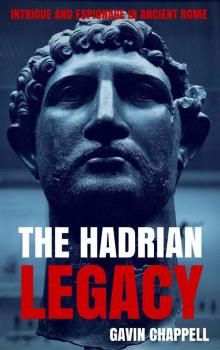 The Hadrian Legacy
The Hadrian Legacy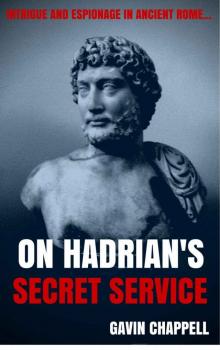 On Hadrian's Secret Service
On Hadrian's Secret Service Murder in Hadrian's Villa
Murder in Hadrian's Villa The Sword of Wayland
The Sword of Wayland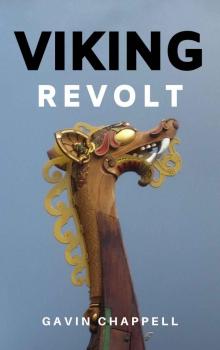 Viking Revolt
Viking Revolt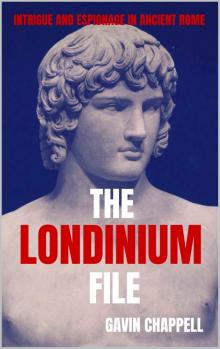 The Londinium File
The Londinium File The Gladiator Gambit
The Gladiator Gambit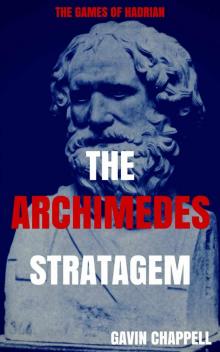 The Archimedes Stratagem
The Archimedes Stratagem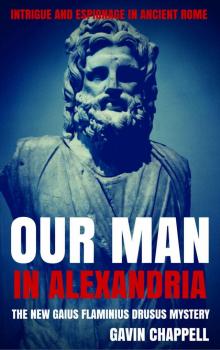 Our Man in Alexandria
Our Man in Alexandria Into the Void (The Dungeoneers)
Into the Void (The Dungeoneers)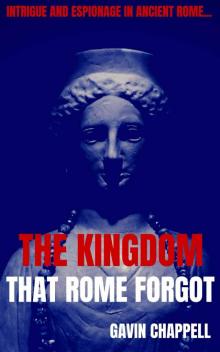 The Kingdom That Rome Forgot
The Kingdom That Rome Forgot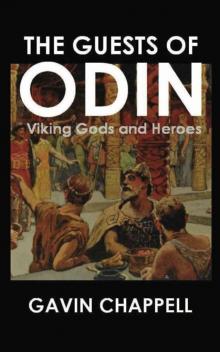 The Guests of Odin
The Guests of Odin